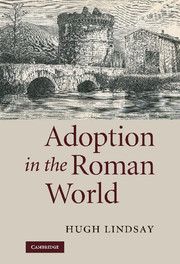Book contents
- Frontmatter
- Contents
- List of figures
- Preface
- List of abbreviations
- Introduction
- 1 Adoption, kinship and the family: cross-cultural perspectives
- 2 Kinship in Greece and Rome
- 3 Greek adoptions: comparisons and possible influences on the Roman world
- 4 Procedural aspects of Roman adoption
- 5 The testamentary adoption
- 6 Roman nomenclature after adoption
- 7 Adoption and inheritance
- 8 Roman freedmen and their families: the use of adoption
- 9 Adoption in Plautus and Terence
- 10 Sallust and the adoption of Jugurtha
- 11 Adrogatio and adoptio from Republic to Empire
- 12 Testamentary adoptions – a review of some known cases
- 13 Political adoptions in the Republic
- 14 Clodius and his adoption
- 15 The adoption of Octavian
- 16 Political adoption in the early Empire at Rome, Pompeii and Ostia; the imperial family
- Conclusion
- Glossary
- References
- Index
11 - Adrogatio and adoptio from Republic to Empire
Published online by Cambridge University Press: 25 January 2010
- Frontmatter
- Contents
- List of figures
- Preface
- List of abbreviations
- Introduction
- 1 Adoption, kinship and the family: cross-cultural perspectives
- 2 Kinship in Greece and Rome
- 3 Greek adoptions: comparisons and possible influences on the Roman world
- 4 Procedural aspects of Roman adoption
- 5 The testamentary adoption
- 6 Roman nomenclature after adoption
- 7 Adoption and inheritance
- 8 Roman freedmen and their families: the use of adoption
- 9 Adoption in Plautus and Terence
- 10 Sallust and the adoption of Jugurtha
- 11 Adrogatio and adoptio from Republic to Empire
- 12 Testamentary adoptions – a review of some known cases
- 13 Political adoptions in the Republic
- 14 Clodius and his adoption
- 15 The adoption of Octavian
- 16 Political adoption in the early Empire at Rome, Pompeii and Ostia; the imperial family
- Conclusion
- Glossary
- References
- Index
Summary
There are relatively few known Republican adoptions. Gardner estimates a total of about three dozen in the elite including the so-called testamentary adoptions (Gardner [1998] 138). Political aims do not always lie behind Republican cases and many may in fact merely represent the designation of an unchallengeable heir to property. There will be some cases in which this also provided a very significant chance of making a claim to succession to whatever political power was at stake. Examples at a lower social level are not recorded, although one equestrian case is treated by Valerius Maximus, that of Anneius (Val. Max. 7.7.2; RE Annaeus no. 4; Shackleton Bailey [1991] 71; 79). The other well-known equestrian case – that of Atticus – is not a true adoption, but a testamentary case. Below this level, adoptions might have been used, but cases have not survived in the type of evidence at our disposal. As adoption was so closely related to succession, it was frequently employed where significant assets were at stake. Adoptions under the Republic have often been deduced from nomenclature alone, a technique now discredited for examples from the Imperial period (Chapter 6; Salomies [1992]). This discussion is restricted to full adoptions under adrogatio or adoptio, since they have different legal implications from testamentary adoptions.
The earliest known example illustrates the difficulty in ascertaining motives for adoption in individual cases. L. Manlius Acidinus adopted one of two sons of the plebeian Fulvius Flaccus (Vell. Pat. 2.8.2) into his patrician family.
- Type
- Chapter
- Information
- Adoption in the Roman World , pp. 146 - 159Publisher: Cambridge University PressPrint publication year: 2009



